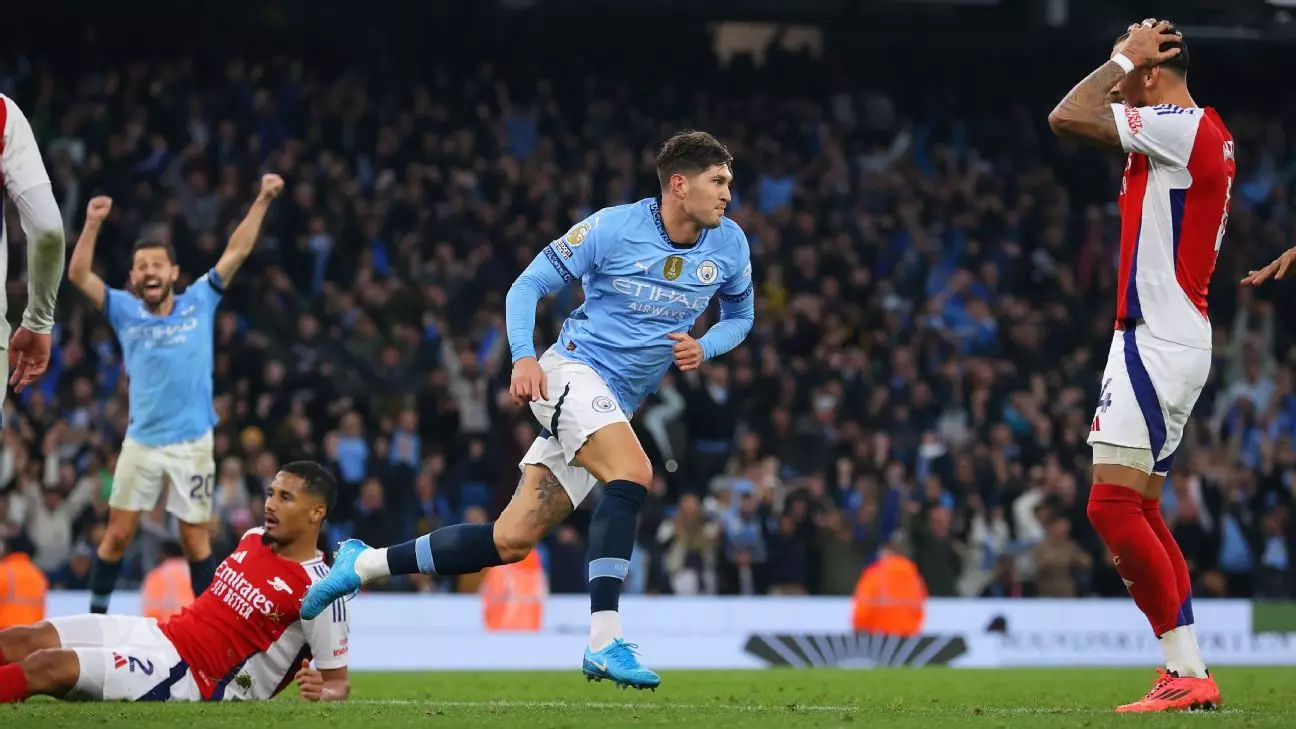In what turned out to be an exhilarating encounter, Manchester City clawed back for a dramatic 2-2 draw against Arsenal in a Premier League clash that showcased contrasting tactical approaches. With John Stones scoring a late equaliser deep into stoppage time, this match not only extended City’s impressive home unbeaten streak but also reignited debates about the strategic choices employed by both teams.
City’s resilience was on full display as they battled back from a precarious position. The draw kept City at the top of the Premier League, with Stones’ goal providing a lifeline in a match that had increasingly slipped away from them after Leandro Trossard’s dismissal for Arsenal. Trossard’s second yellow card, issued for dissent following a delay in the game due to a kicked ball, shifted the dynamics, allowing Arsenal to retreat into a defensive mindset. The Gunners had, until that moment, displayed an aggressive approach backed by strategic play, but now they were forced to absorb the pressure in the latter half.
The importance of maintaining composure in high-stakes matches cannot be overstated. City faced a highly disciplined Arsenal side, one that fully embraced their manageable lead and sought to disrupt their rhythm, a tactic that Stones later highlighted as both “clever” and possibly “dirty”. This term encapsulates the nuances of professional football; strategies that challenge the boundaries of sportsmanship often stir lively discussions among players, analysts, and fans.
Arsenal’s strategy after Trossard’s sending-off marked a shift towards preserving their advantage. Their approach involved tactical fouling, interruptions to the tempo of the game, and a concerted effort to waste time during set plays. While some may view these methods with disdain, particularly in the context of fair play, it’s essential to acknowledge that such tactics can be crucial in securing vital points in matches against formidable opponents.
Reflecting on Arsenal’s gameplay, Bernardo Silva echoed Stones’ sentiments, expressing frustration about the referee’s handling of time-wasting. Silva’s observation that their tactics began from the first whistle indicates a carefully laid plan by Mikel Arteta’s side, aimed at disrupting the flow of the game and capitalizing on every possible opportunity to slow down their rivals. Although City maintained a considerable flow of possession, Arsenal’s interruptions clearly affected their ability to establish a rhythm, ultimately leading to the injury of City’s Rodri and potentially altering the course of the match.
What stood out in Manchester City’s performance was their tactical flexibility under Pep Guardiola. Stones’ willingness to adapt and play in a more offensive role indicates Guardiola’s demand for fluid positional play, which requires players to switch roles dynamically based on game conditions. This adaptability ensured that City retained attacking options even in the absence of their regular offensive starters.
Stones described the communication from Guardiola that led him to move higher up the pitch, highlighting the importance of teamwork in high-pressure situations. This shift proved critical, as his determination to occupy dangerous areas paid off with his crucial equalizing goal. It serves as a reminder that in football, sometimes proactive risk-taking can yield significant rewards, even when the team finds itself overwhelmed.
Moreover, the interplay between Stones and Erling Haaland, who reached his milestone of 100 goals for City during this match, illustrates the team’s depth and attacking potential. Each player’s ability to read the game and adjust accordingly underpins the remarkable achievements of this squad over recent seasons.
The Aftermath: Lessons Learned and What’s Next
As the dust settles from this hard-fought match, both teams have valuable lessons to take forward. For Arsenal, the focus should be on refining their ability to maintain the upper hand in matches where they enjoy numerical advantage. For City, the necessity of countering tactical inflections from opponents without conceding leads poses an ongoing challenge in their title defense.
In what has become a tightly contested league, such matches will have implications for the title race. Both teams will need to navigate the complexities of their respective strategies as they encounter varied opposition throughout the season. As City sit at the summit of the Premier League, their resilience will be tested further, while Arsenal must regroup and find a way to blend defensive solidity with attacking flair in their forthcoming fixtures.
Ultimately, the tactical duel that unfolded between City and Arsenal serves as a compelling testament to the evolving nature of modern football, where strategy, psychology, and execution intertwine in a bid for supremacy.

Leave a Reply